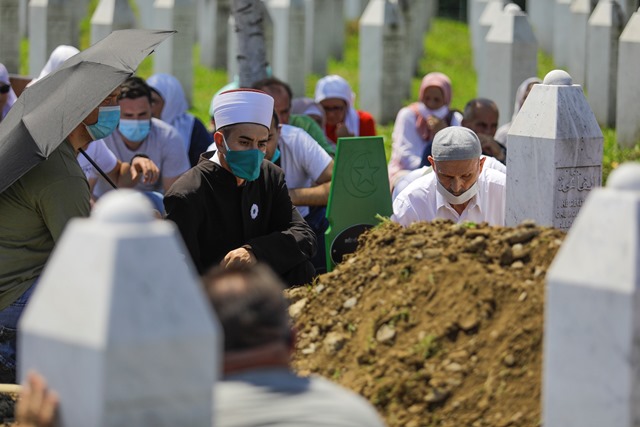By Shabeeb Muhammed
July 11 was the anniversary of Srebrenica genocide. It was considered as one of the worst massacres in Europe afer the 2nd World War. It has been twenty-six years since the 1995 genocide that engulfed a city. Srebrenica still remains as a haunting memory in human minds.
The Srebrenica massacre was a genocide, the Bosnian Serb army ( Serbs from Serbia and Bosnia – Herzegovina) committed against Muslims during the Bosnian War. The Republic of Bosnia-Herzegovina was a part of Yugoslavia. It was a multicultural area inhabited by Muslim Bosnians, Orthodox Serbs and Catholic Croatians. Bosnia-Herzegovina became independent in 1992 after the referendum. But the Bosnian Serbs boycotted the election, wanting to form a larger Serbia, including the territory. Thus, the Bosnian Serbs, with the help of the Serbian government, invaded the new nation.
The exclusion of Non-Serb Bosnians from the territory was necessary to build Greater Serbia. Most of the Bosnian population in the area were descendants of Bosnians who converted to Islam during the Middle Ages under Ottoman rule. So, ‘ethnical cleansing’ was the only way to fulfil their dreams.
One of the survivors of the genocide, professor Amra Sabic El Rayees said in her interview that “Serbia wanted to territorially expand and create ethnically cleansed Greater Serbia, so the Serb army’s primary goal was to isolate and execute us hoping the world wouldn’t find out about the genocide. We were starved. My house was bombed, family members and friends killed and some raped — all simply because we were Bosniaks(Bosnian Muslims). My life, as I once knew it, was destroyed.” Her book ‘The Cat I Never Named: A True Story of Love, War, and Survival’ is a profound account of what they faced during the genocide.
The Bosnian Serb military occupied Srebrenica in the early half of 1992, but later on the same year it was reoccupied by Bosnian Army.Even if the UN in 1993,declared Bosnia and Herzegovina as a safe zone, the sanctions still continued as before. On 6th July,the Bosnian Serb army attacked Srebrenica and arrested the United Nations army.
The Bosnian Serb forces targeted to capture the Srebrenica. Approximately 400 United Nations and Dutch peacekeepers were deployed in the town to provide security for arriving refugees.
On July 11, as the invaders captured the city and held peacekeepers hostage, 25,000 Bosnians fled to Potočari, a UN base outside the city. A shelter was more important to them than the unhygienic environment and extreme heat. And the violence started the next day. From July 12th to 13th, Serb military buses took women, girls and elderly people to Bosnian-controlled areas, some of whom were burned alive. Witnesses said that the Bosnian Serb army forced some young men to see their children being killed and their women being raped. The city was covered with corpses of many innocent souls.
UN tribunal’s inquiry found that the massacre was
Well planned.The judgement against one Bosnian Serb commander stated that “A concerted effort was made to capture all Muslim men of military age,”. Buses carrying women and children were systematically in search of males, and troops took young boys and elderly men who would not have been eligible to serve in the army.
From 13th to 17th of July 1995,more than 8,000 people were killed and their bodies were dumped in more than 80 mass graves. Their goal was to cover up their crimes. Bodies are still being found in different parts of the city. The identified bodies are buried in Potočari Cemetery. Every year, the newly identified bodies are buried on July 11, the anniversary of the war. There were nine martyrs on July 11 in last year, after twenty five years of genocide.
The self-proclaimed leader of the Sprska ,The Bosnian Serb Republic, Radovan Karadžić, and the military commander Ratko Mladic are the main culprits of the Srebrenica massacre. Both were arrested in 2008 and 2011, respectively. The arrest of Radovan Karadžić took place on 21 July 2008 in Belgrade. He was in hiding, posing as a doctor of alternative medicine. While Mladic, who went into hiding after the 1995 war, was captured in 2011 at his relative’s home in northern Serbia. The International Criminal Tribunal for the former Yugoslavia (ICTY) sentenced them and their accomplices to life in prison. But even now, many other perpetrators remain free and live in Serbia, without ever having faced any legal actions.
Mladic had instilled hatred against muslims in his soldiers for years. He spoke of Ottoman Empire, which had conquered the Serbs in the Battle of Kosovo in 1389. That defeat was the reason why Kosovo came under Ottoman Muslim rule for the next five hundred years.
“Serbian soldiers from Kosovo are battling Turks to this day,” Karadzic wrote. “It is an epic fight for survival, for life, with the same enemy: Turks, who since 1389 are making it impossible for Serbian villagers to live in peace.”
Even the Serbian Orthodox Church supported Mladic. ‘ The Serbs celebrated paramilitary commander Zeljko Raznatovic (popularly known as ‘Arakan’) as a hero.Twenty six years after the genocide, Serbia’s political leaders and citizens still do not recognize it as genocide.
The Dutch-led UN Security Council was a complete failure. The UN often fails when the victims are Muslims, as in the case of Palestine and other Central Asian countries. In a place where violence and sanctions are going on,will about 400 activists of the UN become a hindrance for their ten-fold racist opponents?
In 1999, UN Secretary – General Kofi Annan wrote that “Through error, misjudgment and an inability to recognize the scope of the evil confronting us, we failed to do our part to help save the people of Srebrenica from the [Bosnian] Serb campaign of mass murder.”
Without justice, a large community still sits there with the memories of their loved ones. The smell of flesh and blood are still in their nostrils. The lifeless bodies of their loved ones littered over the city are still in their memories.
(Amra Sabic Al Rayees’s interview: https://medium.com/authority-magazine/author-amra-sabic-el-rayess-i-aim-to-humanize-those-who-are-marginalized-hated-and-excluded-ef08a1e89367)
***
Shabeeb Muhammed is a Master graduate in English literature. Mainly focusing on Muslim culture in Indian and Global English Literature. Email Shabiyusuf8@gmail.com




